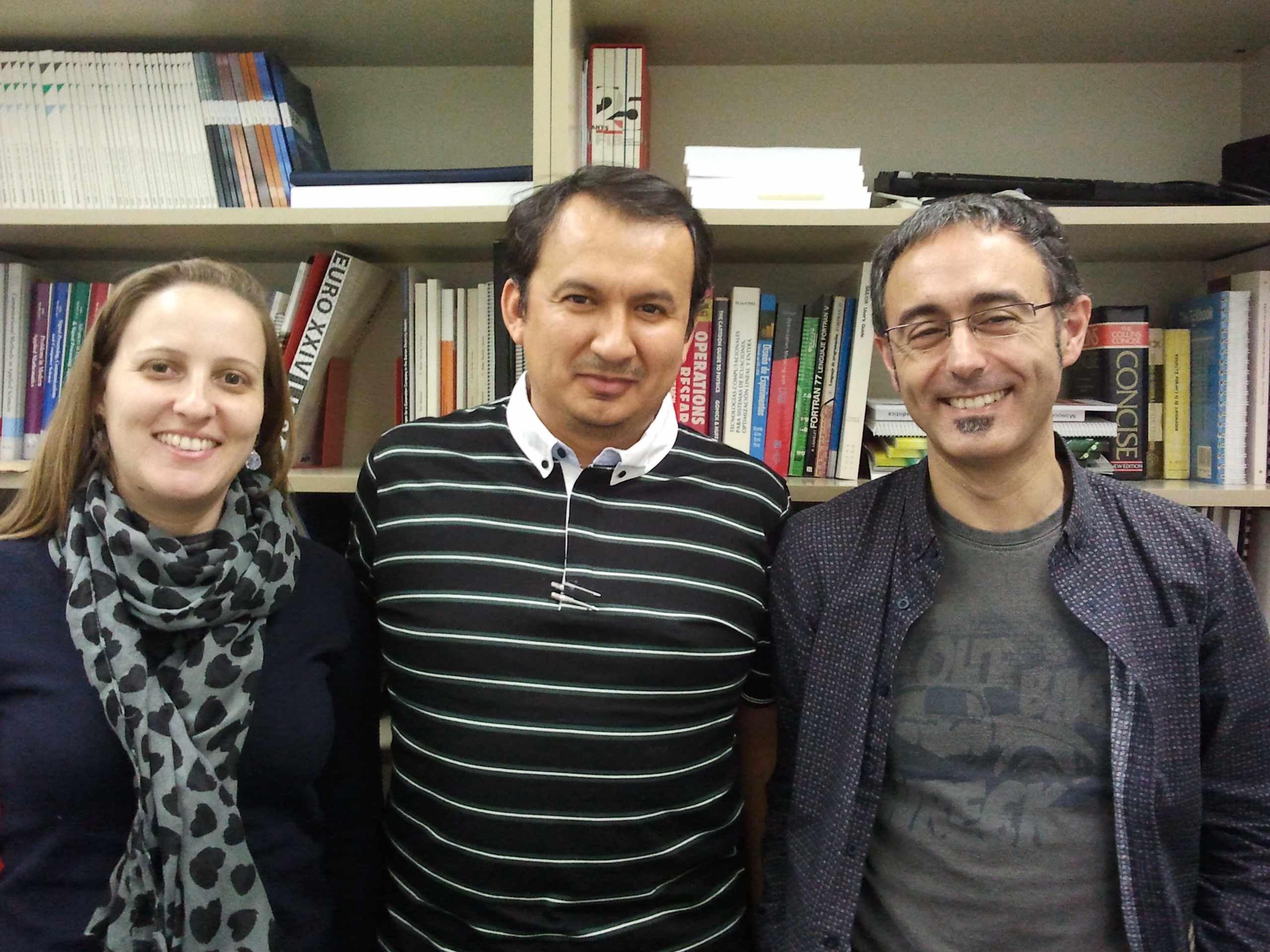stochastic programming
Optimal sale bid for a wind producer in Spanish electricity market
Wed, 10/26/2011 - 13:56 — admin| Publication Type | Tesis de Grau i Màster // BSc and MSc Thesis |
| Year of Publication | 2011 |
| Authors | Simona Sacripante |
| Director | F.-Javier Heredia |
| Tipus de tesi | MSc Thesis |
| Titulació | Master in Statistics and Operations Research |
| Centre | Faculty of Mathematics and Statistics |
| Data defensa | 10/11/2011 |
| Nota // mark | 9 / 10 |
| Key Words | teaching; renewebable energy; electricity market; optimal bid; wind generators; wind; intraday market; wind producer; MSc Thesis |
| Abstract | The objective of this work is to find an optimal commercial strategy in the production market that would allow wind producer to maximize their daily profit. That can be achieved on one hand, increasing incomes in day-ahead and intraday markets, on the other hand, reducing deviation costs due to error in generation predictions. |
| DOI / handle | http://hdl.handle.net/2099.1/13914 |
| URL | Click Here |
| Export | Tagged XML BibTex |
25th IFIP TC7 Conference on System Modeling and Optimization
Thu, 09/22/2011 - 10:33 — admin The International Federation for Information Processing Technical Committee 7 - System Modeling and Optimization - arranges in a cycle of two years highly regarded conferences to several topics of Applied Optimization such as Optimal Control of Ordinary and Partial Differential Equations, Modeling and Simulation, Nonlinear, Discrete, and Stochastic Optimization and Industrial Applications. This year the conference was celebrated in the Berlin Institute of Technology, and I participated with a contributed talk entitled "Solving electric market quadratic problems by Branch and Fix Coordination methods "
The International Federation for Information Processing Technical Committee 7 - System Modeling and Optimization - arranges in a cycle of two years highly regarded conferences to several topics of Applied Optimization such as Optimal Control of Ordinary and Partial Differential Equations, Modeling and Simulation, Nonlinear, Discrete, and Stochastic Optimization and Industrial Applications. This year the conference was celebrated in the Berlin Institute of Technology, and I participated with a contributed talk entitled "Solving electric market quadratic problems by Branch and Fix Coordination methods "
Solving electricity market quadratic problems by Branch and Fix Coordination methods
Fri, 09/16/2011 - 16:37 — admin| Publication Type | Conference Paper |
| Year of Publication | 2011 |
| Authors | F.-Javier Heredia; Cristina Corchero; Eugenio Mijangos |
| Conference Name | 25th IFIP TC7 Conference on System Modeling and Optimization |
| Conference Date | 12-16/09/2011 |
| Conference Location | Berlin |
| Type of Work | contributed presentation |
| Key Words | research; optimal bid; day-ahead electricity market; branch and fix coordination; perspective cuts; bilateral contracts; futures contracts; stochastic programming |
| Abstract | The electric market regulation in Spain (MIBEL) establishes the rules for bilateral contracts in the day-ahead optimal bid problem. Our model allows a price-taker generation company to decide the unit commitment of the thermal units, the economic dispatch of the bilateral contracts between the thermal units and the optimal sale bids for the thermal units observing the MIBEL regulation. The uncertainty of the spot prices is represented through scenario sets. We solve this model on the framework of the Branch and Fix Coordination metodology as a quadratic, two-stage stochastic problem. Numerical results are reported. |
| URL | Click Here |
| Export | Tagged XML BibTex |
Efficient Solution of Optimal Multimarket Electricity Bid Models
Mon, 05/30/2011 - 15:59 — admin| Publication Type | Proceedings Article |
| Year of Publication | 2011 |
| Authors | Cristina Corchero; F.-Javier Heredia; Eugenio Mijangos |
| Conference Name | 8th International Conference on the European Energy Market (EEM11) |
| Series Title | To be published in the IEEEXplore |
| Pagination | 244-249 |
| Conference Start Date | 25/05/2011 |
| Publisher | Institute of Electrical and Electronics Engineers, Inc. |
| Conference Location | Zagreb, Croatia |
| Editor | Marko Delimar |
| ISBN Number | 978-1-61284-286-8/11 |
| Key Words | spot electricity markets; financial electricity markets; Iberian Electricity Market; stochastic programming; perspective cuts; research; DPI2008-02153; paper |
| Abstract | Short-term electricity market is made up of a sequence of markets, that is, it is a multimarket enviroment. In the case of the Iberian Energy Market the sequence of major short-term electricity markets are the day-ahead market, the ancillary service market or secondary reserve market (henceforth reserve market), and a set of six intraday markets. Generation Companies (GenCos) that participate in the electricity market could increase their benefits by jointly optimizing their participation in this sequence of electricity markets. This work proposes a stochastic programming model that gives the GenCo the optimal bidding strategy for the day-ahead market (DAM), which considers the benefits and costs of participating in the subsequent markets and which includes both physical futures contracts and bilateral contracts. |
| URL | Click Here |
| DOI | 10.1109/EEM.2011.5953017 |
| Export | Tagged XML BibTex |
Efficient Solution of Optimal Multimarket Electricity Bid Models
Mon, 05/30/2011 - 15:45 — admin| Publication Type | Conference Paper |
| Year of Publication | 2011 |
| Authors | Cristina Corchero; F.-Javier Heredia; Eugenio Mijangos |
| Conference Name | 8th International Conference on the European Energy Market (EEM11) |
| Series Title | International Conference on the European Energy Market |
| Conference Date | 25-27/05/2011 |
| Publisher | Institute of Electrical and Electronics Engineers, Inc. |
| Conference Location | Zagreb, Croatia |
| Editor | Marko Delimar |
| Type of Work | Contributed presentacion |
| ISBN Number | 978-1-61284-284-4 |
| Key Words | spot electricity markets; financial electricity markets; Iberian Electricity Market; stochastic programming; perspective cuts; research; DPI2008-02153 |
| Abstract | Short-term electricity market is made up of a sequence of markets, that is, it is a multimarket enviroment. In the case of the Iberian Energy Market the sequence of major short-term electricity markets are the day-ahead market, the ancillary service market or secondary reserve market (henceforth reserve market), and a set of six intraday markets. Generation Companies (GenCos) that participate in the electricity market could increase their benefits by jointly optimizing their participation in this sequence of electricity markets. This work proposes a stochastic programming model that gives the GenCo the optimal bidding strategy for the day-ahead market (DAM), which considers the benefits and costs of participating in the subsequent markets and which includes both physical futures contracts and bilateral contracts. |
| URL | Click Here |
| Export | Tagged XML BibTex |
Improving electricity market price scenarios by means of forecasting factor models
Fri, 05/06/2011 - 15:09 — admin| Publication Type | Proceedings Article |
| Year of Publication | 2009 |
| Authors | M.Pilar Muñoz; Cristina Corchero; F.-Javier Heredia |
| Conference Name | 57^th Session of the International Statistical Institute |
| Key Words | research; DPI2008-02153; electricity markets; TSFA; spot price scenarios; paper |
| Abstract | In liberalized electricity markets, Generation Companies must build an hourly bid that is sent to the market operator. The price at which the energy will be paid is unknown during the bidding process and has to be forecast. In this work we apply forecasting factor models to this framework and study its suitability. |
| URL | Click Here |
| DOI | http://hdl.handle.net/2117/3047 |
| Export | Tagged XML BibTex |
Optimización de modelos estocásticos de mercado eléctrico múltiple mediante métodos duales
Wed, 03/30/2011 - 09:47 — admin| Publication Type | Tesis de Grau i Màster // BSc and MSc Thesis |
| Year of Publication | 2011 |
| Authors | Unai Aldasoro Marcellan |
| Director | F. Javier Heredia |
| Tipus de tesi | MSc Thesis |
| Titulació | Màster in Statistics and Operations Research |
| Centre | Facultat de Matemàtiques i Estadística, departament d'Estadística i Investigació Operativa, UPC |
| Data defensa | 16/03/2011 |
| Nota // mark | Matrícula d'Honor (10/10) |
| Key Words | teaching; research; dual methods; electricity markets; DPI2008-02153; mixed integer nonlinear programming; proximal bundle method; optimal day-ahead bid; electricity multimarket; MSc Thesis |
| Abstract | El presente trabajo plantea la resolución computacional de un modelo de optimización de la oferta de generación eléctrica para compañías eléctricas que participan en el mercado eléctrico liberalizado MIBEL. Dicho mercado se circunscribe a España y Portugal y se compone de una serie de subastas energéticas consecutivas donde el operador de mercado realiza para cada una de ellas la casación entre la oferta y demanda. Así, el objetivo de la compañía generadora será maximizar los beneficios obtenidos en la participación del conjunto de mercados teniendo en cuenta el cumplimiento de las obligaciones contractuales ya establecidas. El modelo matemático propuesto para su caracterización corresponde a un modelo de programación estocástica multietapa cuyo equivalente determinista es un problema de optimización cuadrática con variable binaria. Con el objetivo de aprovechar la estructura del problema se procede a plantear la dualización de un grupo de restricciones que producen que el problema original pueda ser dividido en subproblemas. Para su resolución se deberá estudiar la idoneidad de diversos métodos duales (subgradiente, Bundle Methods, ACCPM) y seleccionar el más conveniente para el caso abordado. La decisión finalmente adoptada ha consistido en elegir como método de resolución el algoritmo Proximal Bundle Method descrito en [18] y adaptado satisfactoriamente a problemas de coordinación de la generación hidro-térmica [17]. El análisis de método Proximal Bundle Method corresponderá a su compresión e interpretación gráfica, a la resolución de un ejemplo de pequeña escala de manera analítica y a su resolución computacional. El objetivo de la fase de resolución será valorar el proceso iterativo y la convergencia del Proximal Bundle Method aplicado al problema multimercado de oferta óptima y la comparación de resultados respecto a otro método dual como el método del subgradiente. La implementación computacional se realizará mediante el lenguaje C++, específicamente se utilizará el metalenguaje Concert Techonolgy creado por IBM para el enlace entre el código C++ y el solver CPLEX. Se comprueba que dicho lenguaje tiene como ventajas principales su simplicidad estructural y el compacto código que produce. No obstante la implementación del Proximal Bundle Method manifiesta una serie de limitaciones prácticas de Concert Technology en cuanto al almacenado y actualización de problemas de optimización. Se propone como línea de futuro el análisis de lenguajes alternativos. En todo caso, los resultados obtenidos desprenden que el Proximal Bundle Method se adapta satisfactoriamente al problema multimercado de oferta óptima, además se concluye que en la aplicación numérica considerada un tamaño de Bundle ilimitado produce los mejores resultados. Además en trabajo propone una serie de líneas de investigación futuras en las que destacan la paralelización de la resolución de los subproblemas, y la definición del subproblema asociado a cada térmica como un problema de caminos mínimos |
| DOI / handle | http://hdl.handle.net/2099.1/13917 |
| URL | Click Here |
| Export | Tagged XML BibTex |
Dr. Marcos J. Rider and Dr. Marina Lavorato visits GNOM
Fri, 02/04/2011 - 08:39 — admin Dr. Marcos J. Rider and Dr. Marina Lavorato, both professors of the dept. of electrical engineering of the Univ. Estadual Paulista, UNESP, (Brasil), have been visiting the GNOM site in Barcelona during January as a part of their participation on the research project DPI2008-02153. We are collaborating in the development of new stochastic programming models for the optimal expansion of the transmision network in electricity markets. They already visited our group on 2008, and we expect to continue this collaboration in the future reinforcing the relationship between GNOM and the UNESP, both in research and postgraduate tuition.
Dr. Marcos J. Rider and Dr. Marina Lavorato, both professors of the dept. of electrical engineering of the Univ. Estadual Paulista, UNESP, (Brasil), have been visiting the GNOM site in Barcelona during January as a part of their participation on the research project DPI2008-02153. We are collaborating in the development of new stochastic programming models for the optimal expansion of the transmision network in electricity markets. They already visited our group on 2008, and we expect to continue this collaboration in the future reinforcing the relationship between GNOM and the UNESP, both in research and postgraduate tuition.
Congratulations Dr. Cristina Corchero!
Thu, 02/03/2011 - 16:45 — admin
 Yesterday February 2 my doctorate student, and friend, Cristina Corchero presented her Ph. D. dissertation on optimal bids in electricity markets. Dr. Corchero developed stochastic programming optimization models to find the optimal bid curve that integrates bilateral and future contractes in the sequence of short-term MIBEL's electricity markets.
Yesterday February 2 my doctorate student, and friend, Cristina Corchero presented her Ph. D. dissertation on optimal bids in electricity markets. Dr. Corchero developed stochastic programming optimization models to find the optimal bid curve that integrates bilateral and future contractes in the sequence of short-term MIBEL's electricity markets.
The members of the examination panel were prof. Stein-Erik Fleten , from the Norwegian University of Science and Technology, prof. Andres Ramos from the Universidad Pontificia de Comillas and prof. Jordi Castro, from the Universitat Politècnica de Catalunya. After a very interesting discussion they agreed to give the maximum qualification, Cum Laude, to the research work of Ms. Corchero. I would like to thank the members of the examination committe for their interesting comments and analysis of the thesis contributions. I'm also very grateful with prof. Pilar Muñoz and prof. Marcos J. Rider for their collaboration in the supervision of the thesis.
And, of course, my most sinceres congratulations to Dr. Cristina Corchero.
Short Term Bidding Strategies for a Generation Company in the Iberian Electricity Market
Thu, 01/27/2011 - 15:01 — admin| Publication Type | Thesis |
| Year of Publication | 2011 |
| Authors | Cristina Corchero |
| Academic Department | Dept. of Statistics and Operations Research. Prof. F.-Javier Heredia, advisor. |
| Number of Pages | 166 |
| University | Universitat Politècnica de Catalunya |
| City | Barcelona |
| Degree | PhD Thesis |
| Key Words | research; teaching; DPI2008-02153; electricity markets; stochastic programming; MIBEL |
| Abstract | The start-up of the Iberian Electricity Market introduced a set of new mechanisms in the Spanish electricity sector that forced the agents participating in the market to change their management policies. This situation created a great opportunity for studying the bidding strategies of the generation companies in this new framework. This thesis focuses on the short-term bidding strategies of a price-taker generation company that bids daily in the Iberian Electricity Market. We will center our bidding strategies on the day-ahead market because 80% of the electricity that is consumed daily in Spain is negotiated there and also because it is the market where the new mechanisms are integrated. One of the main contributions of this thesis has been the study the Spanish electricity price time series and its modeling by means of factor models. In this thesis, the new mechanism introduced by the Iberian Market that a fects the physical operation of the units is described. In particular, it considers in great detail the inclusion of the physical futures contracts and the bilateral contracts into the day-ahead market bid of the generation companies. The rules of the market operator have been explicitly taken into account within the mathematical models, along with all the classical operational constraints that a fect the thermal and combined cycle units. The expression of the optimal bidding functions are derived and proved. Once these main objectives were full filed, we improved the previous models with an approach to the modeling of the influence that the sequence of very short markets have on optimal day-ahead bidding. These markets are cleared just before and during the day in which the electricity will be consumed and the opportunity to obtain benefi t from them changes the optimal day-ahead bidding strategies of the generation company, as it has been shown in this thesis. The entire models presented in this work have been tested using real data from a generation company and Spanish electricity prices. Suitable results have been obtained and discussed. |
| URL | Click Here |
| Export | Tagged XML BibTex |
